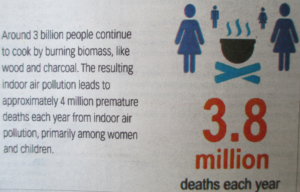
Since 2015, Chrissy Kalulu has been enduring massive smoke while ensuring that over 800 learners at Mnkhupa Primarry school have porridge every morning. The 58-year-old volunteer is one of the unsung heroes in the school feeding programme credited with increasing enrolment, nutrition and performance od pupils.
But selfless women such as her frequently struggle with sneezing, headaches and pneumonia as they inhale smoky fumes from burning firewood and crop residues for cooking.
The exposure to indoor air pollution continues at home, with 98 percent of households in Malawi cooking using firewood. Kalulu explains: “We rely on the pupils to bring some firewood when coming to school. Trees are disappearing. The area has lost almost all the trees due to overdependence on charcoal and firewood.
The pupils walk long distances to fetch firewood. Sometimes, we have to cook using maize stalks. “Oftentimes, when we get home, we fail to do vital chores and income generating activities because of coughs and body pains caused by smoke.”
Not good for everyone
Emma Black says children go to school late. Others miss classes when they cannot source firewood. ” This discourages children from going to school. We are happy that the school feeding programme is encouraging children in this community to go to school, but cooking using firewood is a huge setback,” sha states.
Not any longer. Voluntary Service Overseas (VSO), with funding from the Scottish Government, has installed a plant which turns pupils’ excreta and cow dung into biogas for cooking. VSO renewable enrgy project officer Mtisunge Mngoli says the plant, with a gas pipeline extending all the way to the school toilets, was conceived to introduce cleaner energy in the way the women cook the meals credited with keeping poor and vulnerable leaners in schools.
“The provision of meals in not clean and consistent because of heavy dependance on firewood. This exerts pressure on depleted forests. Massive deforestation exposes poor and marginalised people to the effects of climate change,” she says.

Smokeless fire from biogas is seen as pivotal in improving access to education, health and sustainable livelihhods for women and children who fetch firewood and get exposed to deadly fumes while cooking.
Headteacher Sebastian Kunyata says teachers, parents and volunteers have been trained in how to use the biogas plant responsibly. “We used to experience a lot of challenges in terms of energy sources for the school feeeding programme. We do not want to go back that path again,”he says.
Foundation for Irrigation and Sustainable Develpment (Fisd) has installed a solar power system to run water pumps which irrigate the school garden where the community grows onions and support the school feeding programme. They sell the produce to generate income for buying maize, soya and other requirements for nutritious porridge.
“Fisd provides extension services and operations as well as maintenance to the irrigation system, farm inputs necessary for the crops school identify and markets for the produces,” says Fisd principal manager Clever Nkhokwe.
Garden committee chairperson Eban Chisale says the school garden will benefit immensely from biogas plant. “The cooking technology will help us produce more yied using manure. Previously, we used to buy from farmers,” he says.
Communities surrounding the school have agreed to supply cow dung for the biogas plant, which hadly gets enough stools from the toilets at the school. Each livestock farmer is expected to provide a bucketful everyday.
‘Biogas cooks cleaner’
Hurning out gas for clean cooking marks “the end of their misery” for Kalulu’s group. Regina Japi released a pent-up sigh of relief. SHe says: “The porridge will encourage children to work hard in schools. Biogas cooks clean and faster. As farmers, we will be saving time. We will be returning home early to work in our fileds.”
This is part of K72 million project VSO is running at Mnkhupa, Mchemani, Chiponde, Kanthonga and Malikha primary schools in Lilongwe. VSO aims to train 23 artisans within the communities in constructing the biogas chambers who will be able to construct in other interested schools and homes.
Clean energy for all
Clean fuels for cooking accelerate progress towards achieving Global Goals to end poverty by 2030, especially Sustainable Development Goals (SDGs)
SDG7- sustainable energy for all-is at the heart of the Paris Agreement to leave no one behind in the global energy transition to combat global warming. Yet three billion people globally have no access to clean cooking. The World Health Organisation estimates that indoor air pollution caused by cooking using firewood, charcoal, coal and crop residues contributes to nearly four million deaths a year.
Source: The Nation_July 1, 2019_by Angella Phiri-Staff Reporter
